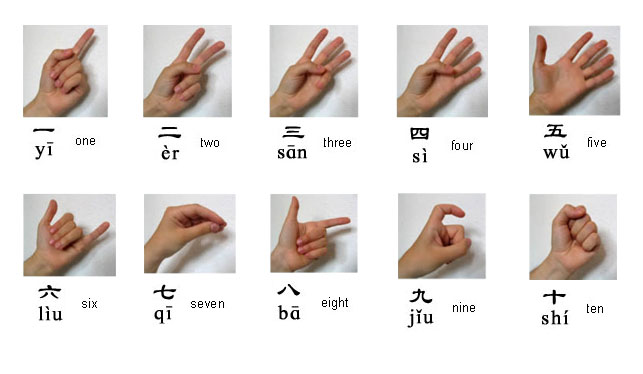tldr: if everything is good with English, start with the course from Tsinghua Chinese, otherwise try the Russian-language
course from SPSU .
Warning: I do not have a goal to learn a language. This is a hobby to take yourself on the road, when you can not do something more useful. Chinese, because it is rather complicated, but not a dead language. I emphasize that if you do not need to communicate with the Chinese, then there are no special advantages for learning Chinese. So, if you have other interests to spend time on the road, you should not change them.
disclaimer : Moreover, it is not necessary to study non-core language instead of professional self-education. Learning languages has the potential to affect your life. If you notice some disturbing symptoms, tell your nurse or doctor about your observations.
difficultiesIntonation (“tone”) in Chinese is very important.

Humorous video about tones (Caution!)
A limited number of tinted syllables, easy to get confused.
Ideological way of recording (Chinese, Hanji), but you can rarely guess the meaning. It is difficult to memorize Hanji.
The evolution of hieroglyphs, on the example of "fish":
Not a lot of borrowing from European languages. Borrowing is highly mutated.
I write Chinese everywhere, I mean putonghua. In fact, there are many "dialects", some of which are separate languages. Pictographics ("hieroglyphs") are also different. Be sure to know that there is a traditional (used mainly in Taiwan) and simplified Chinese writing.
Opinion of Russian-speaking vloger (Caution!)
Detailed lecture on Chinese characters from Albert Krisky
However, it is interesting to study, there are quite funny cultural moments, such as counting on fingers in Chinese:

Why coursera / edx:- Less chance of running into mistakes. The authors of the courses are experienced teachers, native speakers.
- Usually the courses are well prepared. Video quality at a height.
- There are mobile applications, tests, subtitles and pdf.
- Free and do not require a subscription. You can download the entire course entirely and not depend on the policy of the resource.
- Video courses are easy for beginners. (Of course, they cannot replace real learning.)
(+) Russian-language course from one of the leading universities
(+) thorough approach (explanations available, good course structure, phonetic analysis, etc.).
(±) is similar to the transfer of the traditional-strict university course to online (perhaps the course is a bit more difficult for people without a university education).
English courses from Peking University:
(+) the first available course on Coursera (hence its disadvantages)
(+) available explanations
(+) understandable English, the course can be listened to as a podcast.
(+) is a sequel to
More Chinese for Beginners .
(-) no hanji, all through the
stump- pinyin
deck (Latin transcription, can be regarded as a plus)
(-) video quality
(-) no situational interactive
(+) interactive dialogs.
(+) slow speech
(+) Hanji, Pinyin.
(+) there is a continuation -
specialization (
HSK2 ,
HSK3 PART I ,
HSK 3 PART II )
(-) A bit old fashioned (compared to Shanghai and qinghua).
example from the course: It is unclear how useful the course is. In fact, this is a video with writing Chinese characters. It is unlikely that in this course you can remember the characters, except to practice in the style.
(+) interactive dialogs.
(+) Hanji, Pinyin.
(+) explanation of the rules, as well as cultural characteristics.
(+) course is divided into
3 parts in specialization(+) A short and interesting introductory course in Chinese. I believe that this course is most suitable for beginners.
(+) interactive dialogs / history.
(+) Dialogues are repeated, with parsing.
(+) no extra information
(+) in an unobtrusive form, learn how to learn the language further (flash cards, wechat, Pleco, etc.).
(+) Hanji, Pinyin.
(+)
energetic teacher interactive dialogues / history.
(+) Dialogues are repeated, with parsing.
(+) divided into
3 courses(±)
Taiwanese Chinese Dialect and Traditional Chinese- many dialogues are not voiced by native speakers.
- In the course, first they give to learn a series of words / ideograms, then they show a sketch using them. It will be difficult for a beginner to memorize words (many words are entered at once, as compared to other courses) and, all the more, to recognize them in a dialogue.
Mandarin Chinese for Business . At first glance, the course is too attracted to the business - they immediately give a lot of Chinese “words” and phrases from the business lexicon (find partners, sign a contract, etc.).
Spanish Course by University of Arizona: hino-basico
I do not recommend under any sauce, despite the charisma of teachers. The course is a disorderly collection of popular Chinese phrases (pinyin, sometimes hanji) with translation. Added only for comparison with other courses.
Up. reworked the text a bit.
Criticism and suggestions are welcome.Thank you 蝙蝠侠.
tips toolsIf you have a lot of free time, read the
store and the
BCRS , there you can find good recommendations for learning the language. And best of all textbooks / tutors / university. Fl section on lurkmoar also recommend reading.
Anki, Memraise, Duolingo
Pay attention to the recently released
Chinese course from duolingo .
For android, there is still
chineseskill and hundreds of others.
(+) training of recognition, memorization, writing.
(-) method-memorization (can be very boring), The problem is that such tools often lead to the illusion of knowledge of the language, despite the "advanced algorithms" (srs, tests, etc.).
Use g.translate and
BCRC to practice
- The problem of translators - Youtube , other video sites (
www.viki.com ).
(+) many materials, including from native speakers
(-) need to be able to filter materials, this is a bad task for a beginner
(-)
errors, a lot of errors and delusions!
(-) dialects
Audio Courses: Michel Thomas, Pimsler, Glossica
(+) training perception on hearing, motivation
(-) method-memorization (can be very boring), quality of courses, low efficiency, glossy is not at all suitable for beginners (definitely not “A1, A2”)